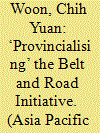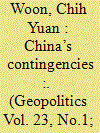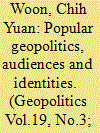|
|
|
Sort Order |
|
|
|
Items / Page
|
|
|
|
|
|
|
| Srl | Item |
| 1 |
ID:
182694


|
|
|
|
|
| Summary/Abstract |
This paper reflects on how the Belt and Road Initiative (BRI) can contribute to more cosmopolitan forms of theory-making and the diversification of knowledges. It focuses on emerging Chinese narratives of the Digital Silk Road (DSR) that cast the initiative as emblematic of an improved BRI 2.0 in the (post-)pandemic era. With subterranean fibre-optic cables and satellite systems constituting important components of the DSR, I argue that these Chinese discourses fundamentally expose the ‘horizontal’ bias in infrastructure debates, thereby forcing an analytical re-orientation towards the notion's volumetric possibilities. Reconceptualising infrastructures in volumetric terms opens up opportunities for interrogating issues of representational politics, power and sovereignty that matter for the DSR and beyond. Using Chinese perspectives of the DSR for the purpose of theory-building, however, does not equate to endorsing Sinocentrism or privileging the BRI as a totalising framework for interpreting the world. Rather, it signifies an effort to ‘provincialise’ the BRI – ensuring that different voices and subjectivities can co-exist in the ongoing and unfinished project of rethinking/reconstructing the BRI.
|
|
|
|
|
|
|
|
|
|
|
|
|
|
|
|
| 2 |
ID:
158362


|
|
|
|
|
| Summary/Abstract |
This paper examines the intimate relationship between narratives emanating from China and their uses of Chinese history, and how such perspectives inform China’s geopolitical positioning and practices in lieu of its purported ‘rise’. Taking inspiration from the deconstructive impetus of critical geopolitics, this article contends that these historical claims to China’s rise constitute deterministic accounts, hinging on the notion of Chinese exceptionalism to provide discursive backing for a Sinocentric geopolitical order in the coming decades. This in turn downplays ‘alternative’ historiographies that can shed light on how the nature of China’s emergence may be more dependent on and shaped by the external environment than previously acknowledged. Building on the historical-geographical expositions related to the idea of contingency, this article demonstrates how China (whether it be in the past or present) cannot be seen as operating in a vacuum but has to constantly negotiate and adjust its strategy of engagements/interactions based on the specific demands imposed by world politics. Specifically, by elucidating these dimensions through cross-strait relations between China and Taiwan, it is argued that understanding China’s contingencies can raise important questions for us to critically appreciate the contextual actors, processes and relationships that differentially impact on China’s engagements in the world.
|
|
|
|
|
|
|
|
|
|
|
|
|
|
|
|
| 3 |
ID:
189385


|
|
|
|
|
| Summary/Abstract |
This paper maps out contemporary discourses of Chinese diplomacy that have proliferated under the aegis of ‘major country diplomacy with Chinese characteristics’. We examine how these narratives are underpinned by webs of relationality that see China promoting equal and win–win partnerships with other state actors, yet are also defined by hierarchical premises for such diplomatic engagements. These relational contradictions are most clearly manifested when we interrogate the spatial dynamics of China’s diplomatic endeavours through the Belt and Road Initiative (BRI). By scrutinising the geopolitical imaginations, sites and scales associated with the BRI, we turn attention to three spatial tensions that are closely bounded up with the relational contradictions of Chinese diplomacy: ‘win–win’ diplomacy promoting a ‘harmonious world’ versus territorially based diplomacy; periphery diplomacy versus the global ambitions of BRI; and the centralisation versus decentralisation dimensions of Chinese diplomacy. This allows us to make sense of the multiplicity of descriptors that have been affixed to Chinese diplomacy, in order to underscore the ‘work’ they perform to bequeath (at times, divergent and contested) meanings to China’s new foreign policy approach. Hence, a relational and spatial understanding of Chinese diplomacy, we argue, can reveal a more nuanced picture of the promises, potential and disjunctures of China’s rapidly expanding geopolitical and diplomatic actions on the international stage.
|
|
|
|
|
|
|
|
|
|
|
|
|
|
|
|
| 4 |
ID:
134633


|
|
|
|
|
| Summary/Abstract |
Audience research has traditionally been neglected within the subfield of popular geopolitics. However in recent years, geographers are increasingly focusing on the making of geopolitical meanings by audiences as they consume popular culture and related texts. Drawing on recent assemblage thinking in geopolitics, this paper argues that audiences form part of the animators of a network that links the human body with places, environments, objects and discourses related to geopolitics. By investigating Filipinos’ critical readings of and engagements with the ‘war on terror’ in Mindanao as represented through the national newspaper, the Philippines Daily Inquirer, the agency and power of audiences in the creative enactments of geopolitics and geography are illuminated. As such, understanding the complex interactions between popular media and its audiences can prove useful in casting insights into the everyday, geopolitical ‘playing out’ of issues of terrorism, violence and peace in the Philippines context and beyond.
|
|
|
|
|
|
|
|
|
|
|
|
|
|
|
|
|
|
|
|
|